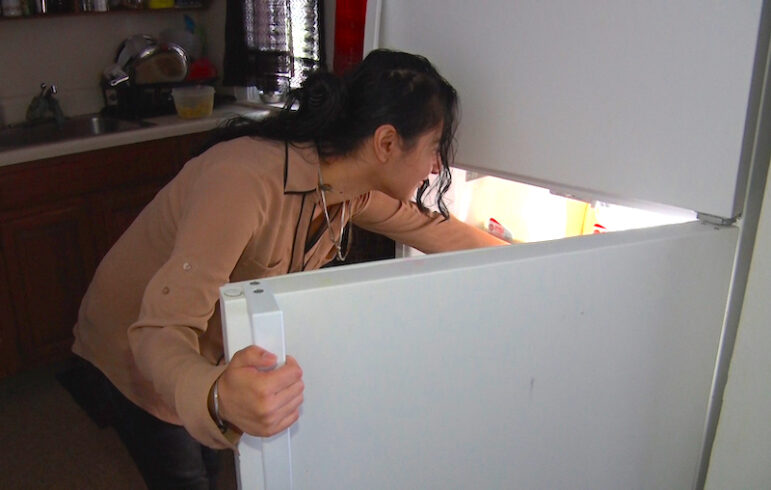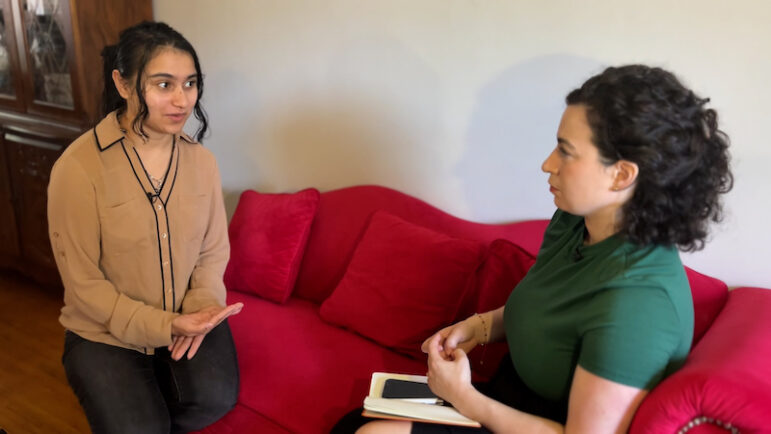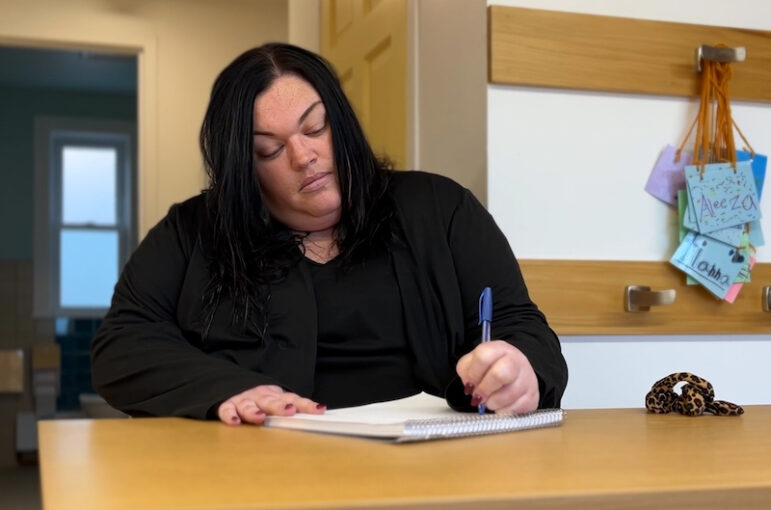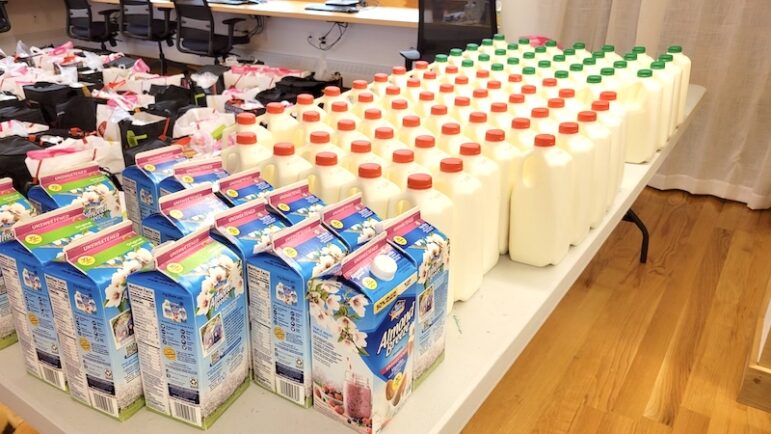
A glass of milk and a granola bar, eaten slowly; this is breakfast for 19-year-old Shivani Sharma. On this particular day it’s noon and she actually hasn’t eaten yet. It may not seem extraordinary, but for her, these days, it’s a big improvement in her situation over how she had to live at the end of high school.
Sharma shared her story with Watertown News, in conjunction with Watertown Cable Access Television, as part of the series “Watertown’s Hidden Problem: Food Insecurity Among Us.” (See part one here). This part also goes further into one of the programs covered in Part One, the delivery of groceries to families in public housing that began during the pandemic to address growing rates of food insecurity in Watertown.
Every day, and night, was a struggle for Sharma late in her time in high school …
“During that time it was very difficult for me to get food,” Sharma said. “I went to sleep hungry. I would wake up in the middle of the night due to hunger. I would try to eat very little throughout the day.”
Sharma is just one of approximately 1.6 million people in Massachusetts who find themselves unable to access or purchase food regularly, according to the Greater Boston Food Bank. In Watertown specifically, the Massachusetts Area Planning Council estimates that in 2020, 13.3 percent of households were food insecure. Per Project Bread, as of September 2023, 18.8 percent of Massachusetts households were food insecure. That’s only slightly down from a peak of 19.6 percent during the pandemic, and still more than 10 points higher than pre-pandemic levels of 8.2 percent.
Sharma immigrated to Natick from India with her family when she was 7. The family moved to Watertown when she was around 9, she recalled. At that young age, because of her good English, she became the family bureaucrat, helping everyone fill out SNAP (Supplement Nutrition Assistance Program, formerly called Food Stamps) and unemployment forms.
Stressors kept piling up. Her brothers were working dangerous, low-wage jobs like driving trucks and taxis — often 12 to 14 hours a day — when COVID started. Her father passed away in 2020 during the pandemic of an unrelated illness. Sharma moved into public housing with her mother when she was 17 in October 2021.
There were some programs to help them. In 2022, Watertown Housing Authority partnered with Stop & Shop to provide residents with subsidized groceries depending on household size. Sharma and her family got around $100 of food for free that would be delivered to their doorstep.
“It was perfect,” Sharma said … when it worked.
The program ended after a few months, and what’s more it was not without its hiccups: the store would run out of products, or miss a delivery without notifying them. It seemed like half the time, she said, it didn’t work.
In March 2022, her mother temporarily went back to India to care for her ailing health. Her two sisters were married into other families and unable to help very often. Sharma lived completely alone for three weeks, and continued to have to fend mostly for herself for many months due to her mother’s weakened state. Unable to get a work permit, she didn’t have any money. At times she ate only one meal a day, while trying to finish high school.
“I tried everything,” she said. “I drank more water. It just made me more hungry. I tried cooking; I didn’t know how to cook. I burnt food a lot of the time. My mom got SNAP benefits, but I didn’t know how to use them. I didn’t have access to a grocery store.”

A teacher brought her a bag of food once or twice. She would visit the local food pantry but the food there was often unsatisfactory, or just flat out something she couldn’t eat in accordance with her religious observances.
“To me, a lot of the food wasn’t good,” she said. “It was moldy and not very edible. And as a vegetarian I have very strict dietary needs. According to my religion, I can’t have meat or even eggs.”
Did she ever think of of straying from religion for the sake of hunger?
“That was never a question, I’ve never eaten those deliberately,” she said.
She’s still not completely recovered from all the nutritional deficiencies she developed from that time period. And, school became a daily struggle.
“My school journey was going very much downhill,” she said. “My physical energy was absolutely depleted. I would have to walk to Watertown High School — it’s a 25 to 30 minute walk — and I couldn’t.”
Her social life suffered, too.
“My friends didn’t understand. They thought I was making big deal out of nothing and that I should be in school,” Sharma said.
On days she couldn’t summon the energy to go to school, she would receive texts from friends asking where she was, and she would respond that maybe she would try tomorrow.
“There was a huge disconnect between me and other people my age,” she said.
In addition, gym is a mandatory class for all four years at Watertown High School.
“We would have to walk around a field for an hour. Imagine what that did to my body,” she said.
She was physically tired all the time. She was hungry all the time. Her mental health was not in a great place.
“When you’re hungry, all you think about is food,” she explained. “My mental health was telling me to stay in bed. But then my hunger was like, ‘get up, you need to eat.’ But there’s no food anyways. It’s just going to be a waste. And you ask yourself why isn’t there enough food? Why can I, as an 18-year-old, provide for myself? And so it was just like a loop of negativity. There was a lot of self-blame.”

Despite the struggles, she managed to graduate and now works a part-time job as a pharmacy technician for CVS, which she balances with interning for State Senator Will Brownsberger. One of her sisters who lives in Belmont and has a car now has the means to occasionally bring her groceries or take her to the store. But her eating habits have still not quite normalized. There are days she says she’s still only eating one meal a day. And grocery stores are still too far from where she lives.
“Transportation is a big thing,” Sharma said.
The WHA homes are a 15-minute walk to the closest bus stop. That’s assuming the buses are reliable, or that they’ll stop anywhere close to a grocery store, which many do not do. This can turn a simple trip to the grocery store, which might take someone with a car an hour to complete, into an odyssey that eats up half a day and all of a person’s energy.
Even when she does have money for food, and has the means to get to the grocery store, transporting the food is still an issue. Carrying multiple bags is not an option.
“I’m not a very strong person, so I have to limit the food I’m getting,” she said. “My arms will ache at the end.”
For now, Sharma is still living in public housing, taking a gap year before she starts applying for college.
“I want to be a college student. I want to do my full bachelor’s degree,” she said. “I don’t know after that what I want to do, but I want to save up and get an education.”
She has her high school degree and her fridge is fuller than it used to be.
“I know how to cook now,” she said. “My siblings are in a better financial situation where they can help me.”
A Source of Relief: Free Groceries
One program does still exist for Watertown Housing Authority (WHA) residents like Sharma. In a current deal with a few local food providers, residents get grocery deliveries from Roche Bros. once a month. One week a month during the Farmers Market season from June to October, residents of the WHA also get fresh produce delivered from market vendors in addition to the Roche Bros. bags.
A federal grant makes the program possible. Sarah Wood, another WHA resident, is also the CDBG (Community Development Block Grant) Food and Security Program Coordinator for the Watertown Housing Authority, part of which entails overseeing the intake and distribution of the grocery bags for families. The grant was received by the Watertown Community Foundation. Distribution happens at the family resident complexes, Lexington Gardens and Willow Park.
“It’s very convenient,” Woods said. “A lot of our tenants don’t drive, and the Learning Center is easily accessible to everybody up here. So they just shoot over, grab their groceries.”
A lot of the tenants do receive AFDC (Aid to Families with Dependent Children) or SNAP benefits, but those only become available once a month. These food distribution events come in the middle of the month.
“It’s getting them through the month, it’s getting them over that hump of, you know, otherwise they may have to go get noodles or something,” Woods said.

Woods is a lifelong Watertown resident and a fixture around the WHA community, which she says helps remove a lot of the stigma folks may feel when it comes to accepting free food.
“I think a lot of the tenants feel comfortable in a sense that they’re coming to pick up groceries from another tenant,” she said. “You know, sometimes it could be a sense of embarrassment, but we make sure that there’s none of that.”
The current program allows for customization according to household and Woods does her best to take requests. Kids can get favorites like Goldfish crackers. Fresh fruits and vegetables are available. Families get insulated and non-insulated bags.
“You know, every penny counts,” Woods said. “And now that we have this program, it’s definitely like a sense of, they can count on this, they can count on the food coming, they can build their meals.”
In November, Sylvia Freeman, a resident of Lexington Gardens, picked up three bags of food including frozen items, which she said will last at least a week. The grocery program is helpful for her because she does not have her own vehicle, so she is usually circumscribed to going to Market Basket in Waltham because it is on a bus line.
“This saves a lot of time and money because prices in the supermarkets have gone up. So this helps us to save money in the supermarket,” Freeman said. “We can we can cut down on some of the money we spend in the store and they’re able to feed their children as well.”
Rania Choughri, another resident who lives in Lexington Gardens with her family, said she found the program very generous.
“It’s enough for a family and there’s a lot of nutrition in it,” Choughri said. “It’s different fruits, vegetables, oil, meat, fish, and groceries. I really, really appreciate Roche Bros. and the market farmers.”

Grocery pickup days are also a social event for the residents, Choughri said.
“We can meet each other here,” she said. “I’ve been here since February, I’m new here but I now have neighbors!”
The bags from the Watertown Farmers Market contain fresh produce from the farm stands, and something from the specialty vendors, such as barbecue sauce and jam. Sometimes the deliveries include veggies that people may not be familiar with, but Woods tries to lend a hand.
“I’ll open the bags and then I’ll go online and I’ll print out some recipes, some ideas that the tenants can use with the stuff that’s in the bag. And then we also have a Facebook page for our tenants that it’s just the tenants that live here that are on the page,” Woods said. “It’s like a private group that you can join and a lot of the tenants will repost what they made like pictures or what they may give other tenants ideas, which is awesome, too.
All in all, the free food program is stress relief for a lot of people, Woods said.
“A lot of the tenants are head of their household, so it’s single moms or single dads. They’re carrying the weight of the world on their shoulders,” she said. “There’s a stigma in general that, if you live in public housing, you may be on welfare. If you live in public housing, you may be home all day. In Watertown, that couldn’t be any farther than the truth. I would say the majority of people who live here are working, if they’re physically able to, and work good jobs. They’re hard working people, and they’re also juggling being a parent to their kids.
“So this program alleviates a little bit of that. You’re like, OK, I’m getting this bag of groceries next week. My kids will be good. It’s like a sense of relief, which, in this day, is priceless.”
(Watertown News Editor Charlie Breitrose contributed to this story).
The Series
This is the second part of a series looking at food insecurity in the community, co-produced by Watertown News and Watertown Cable Access Television. The series looks at those making use of the local and state food insecurity programs, the people on the front lines providing help, and sought to find out what else can be done. Watertown Cable will be producing a series of programs looking at the issue airing at a later date. The series is made possible, in part, by a grant provided by the Watertown Community Foundation.
Resources
Watertown Food Pantry: 80 Mt. Auburn St. (rear of the Belmont-Watertown United Methodist Church), uesdays from 10 a.m. to 2 p.m. https://www.watertown-ma.gov/330/Watertown-Food-Pantry, 617-972-6490
Watertown Catholic Collaborative Food Pantry: 770 Mt. Auburn St. (basement), Thursdays from 10 to 11:45 a.m. https://watertowncatholic.com/news/food-pantry 617-926-7121
Watertown Community Fridge: 80 Mt. Auburn St. (Front of the Belmont-Watertown United Methodist Church), Open 24/7 https://www.watertowncommunityfridge.org/
Watertown Social Services Resource Specialists: at Wayside Multi-Service Center, 127 North Beacon St. https://www.watertown-ma.gov/673/Watertown-Social-Services-Resource-Speci 617-744-9585
Live Well Watertown/Watertown Farmers Market: City Hall, 149 Main St. 617-972-6446 x8 https://www.livewellwatertown.org/home
Watertown Community Foundation: https://www.watertownfoundation.org/ 617-926-1500
Food Pantry at American Legion Post 440: 295 California St., Newton, 3rd Fridays from 10 to 11 a.m. 617-244-0440
Centre Street Food Pantry: 11 Homer St., Newton, Tuesdays 2:30-6 p.m. & the first Saturday of the month from 11:30 a.m.-2 p.m. 617-340-9554
SNAP: (formerly Food Stamps) https://www.mass.gov/snap-benefits-formerly-food-stamps
Project Bread: https://www.projectbread.org/ Food Source Hotline (1-800-645-8333)
Thank you for running this series. It is eye-opening.
Shivani, we met a few times. If you would like help with college apps, please let me know!
Thank you for this information, sad as it is. I hope Watertown and the Watertown Community Foundation can keep funding this important program.
I think this should be mando reading for students who are blessed not to have to deal with food insecurity. Thank you for this important article covering this topic. As a teacher for BPS and a health care worker in pediatrics I am all to familiar with children and students with food insecurity. I have my kids read it and use this as an important tool for awareness of what their classmates might be going through.
I graduated from Paseo HS June, 1953. My grandfather, Garabed Khederian, “exiled” me from Watertown the summer of 1951 and to make a long story short, I wound up in Kansas City, MO, where I was reunited with my mother. She was unaware that I was arriving, ill prepared to accommodate me. It was but a few months later that she informed me that she had to return to Massachusetts due to ill health; I informed her good luck, I am not going back there. And that is the way it was. For two years I worked part time jobs, Missouri had a Cooperative Occupational Educational (COE) program that allowed students to attend school four hours in the AM for four solid subjects, and the afternoons were to be devoted to the part time job (I violated the terms and worked three, out of necessity). I signed my report cards, got caught during my senior year, in February of 1953. My home room teacher called me to the front of the class and asked about the signatures on the card, I said they were mine, I had been signing them for my junior and senior year; she marched me to the principal’s office, I related my story, and so what could he do to me? I graduated that coming June, 4 months later and enlisted in the U. S. Marine Corps. The moral of the story is you do what you know that you have to do; you eat whatever food is available, period. I did not approach any church or NGO for help, because at age of 15, they would probably incarcerate me in some state foster situation. No one gave me any food, nor did I ask anyone for same. I had to purchase my own school books and supplies, Missouri did not issue them. As far as I am concerned, this girl’s story doesn’t fly. So now she expresses a desire to attend college; and just who is going to pay for that? We had a devil of a time getting our four children through college, even with some hard earned resources (G. I. Bill) available. Currently there are MILLIONS of individuals breaking our laws and ILLEGALLY crossing our borders. Guess who is going to pay the freight on health care, lodging, and sustenance. Our country can not even raise individuals to serve in the Armed Forces, with the Army, and Navy coming up hundreds of thousands of candidates short for the last two years. All I choose to say is, too many U. S. citizens have their heads in the sand (or elsewhere). I served twenty years in the U. S. Marine Corps, fought in some campaigns in Vietnam, and now watch as the country fades away. One last comment: there is no free lunch. Someone has to pay for it. You want to help this young woman and others like her? Put your money where your mouth is, but do not use my tax dollars. Will Clifford, Captain, USMC (Ret)
Mr. Clifford – I support your right to speak out, but I don’t want the country that you write about. We need immigrants precisely for the reason you point out …. there aren’t enough native-born workers in many low-skill jobs nor enough young people willing to serve in military. Throughout our country’s history, immigrants (including my ancestors) have filled similar gaps and allowed our country to grow.
Our society should encourage all people who want to attend college to do so – this improves our economic competitiveness vs. other countries and makes our economy stronger. Many jobs today require MUCH more education and skills, as a price of entry, than when you were young. I would rather my tax dollars support education than the military.
Do not DARE to question someone else’s religion or their dietary requirements. Your views are not superior. I suggest that you spend some time to LEARN more about people who aren’t like you.
It’s sad that some people speak loudly and lack any compassion for others. Thanks for pointing that out.
I wish some entity had shown compassion for my four children’s college expenses, Mr. Fahey. What has she done to warrant any financial assistance for college expenses? And is she any different than the millions of other immigrants awaiting legal disposition? Do I gather from your comment that compassion for others dictates college expenses picked up by the taxpayers?
Mr. Clifford, I don’t necessarily think that the issue is what this young women has done, but rather what she might do with her education. Immigrants often have the drive and gumption to do amazing things. And that is to the benefit of our community and our country. Always has been, but unlike my first generation grandfather’s time, more education is required these days.
I wish that your children’s educations had been paid for. That is the case in many advanced countries–if you can meet the educational requirements, you can attend. Such a system would greatly benefit our country.
Dear Will, I understand your frustration at what must seem like kids have it easy these days. But easy many don’t have. I suspect you had help along the way when you were growing up. I left home when I was 14 and have had to find my own way like you. But I have also had help from people along the way and helping each other makes the world a better place. We are all family trying to get along on this little speck in space called earth. There is no us and them, only us and if we can find ways to help one another we will all be better for it.
May the holidays be full of joy, family and friends. If we ever meet, I will see you as a friend.
Hi Kathi Breen ~ I travelled throughout the world learning about people who aren’t like me during my 20 year Marine Corps career. I know enough that individuals with religious dietary requirements that find themselves on the point of starvation somehow make those requirements somewhat elastic, for themselves and their children; imagine that. And if those funds to feed someone’s religious dietary requirements are coming out of tax payer dollars I will certainly DARE to question it. I understand the need for immigrants; vetted for health and moral turpitude, and even a certain level of intelligence. They add to the strength of our country, as long as they are self sufficient. So, if you are aware of current events, you should be aware that New York, Boston, Chicago, and many other cities are being swamped with individuals violating our sovereign borders; Los Angles and San Francisco are stuck with tent cities on their sidewalks with deplorable health and sanitation problems. Criminals are robbing retail stores with no penalties attached. And you want to pay for non-citizens college educations while American citizens struggle to pay for that privilege. Amazing.
It is laughable that when the rubber hits the road, you would support funds for education rather than the military.
Mr. Clifford:
First, thanks for your service. Many of us are proud of you.
And, you are not alone in your views. The silent majority is behind your beliefs. We’ll see what happens next year – as we cannot continue as we are now.
You may think this is an inspiring story of grit and gumption but it’s not. It just comes across as a stunning lack of empathy and compassion. It’s not far off from a rich person telling a poor person “have you tried earning more money?” or “I don’t believe your poor maybe you just waste your money”
Nobody wants to be hungry. Nobody deserves to be hungry, especially school aged kids. Sounds a lot like your blaming the victim because that’s the easiest way to justify not doing anything to help them.
What a courageous young lady for sharing her story and struggle with us all. Thank you.
It seems a sad truth that people who arrive a little while after other people suddenly decide that the way _they_ see and plan to live in the country is the only truth, regardless of who came before. But then, when still newer waves of people arrive a little while after that, the less recent previous arrivals still claim to have the only truth about how to live in the country that has had wave after wave of “late” arrivals since the 17th century.
Each wave has thought they were entitled to everything the country has to offer but that they are also entitled to impose their concept of life, law, and liberty on everyone else — AND that people coming in later waves of arrival are NOT.
I’m aware of the degree to which enslavement didn’t follow that pattern, but here in the 21st century, the fractured evolution of certitude about whose current idea of how the country should be the deciding one is more evident than ever.
There have been serious limits to the actual “melting” in the melting pot. And until all arrivals intending to stay in the USA stop insisting that their way is essential — and no one else’s is — there will be no true life, law, or liberty here. You can’t celebrate difference if that’s all you see.